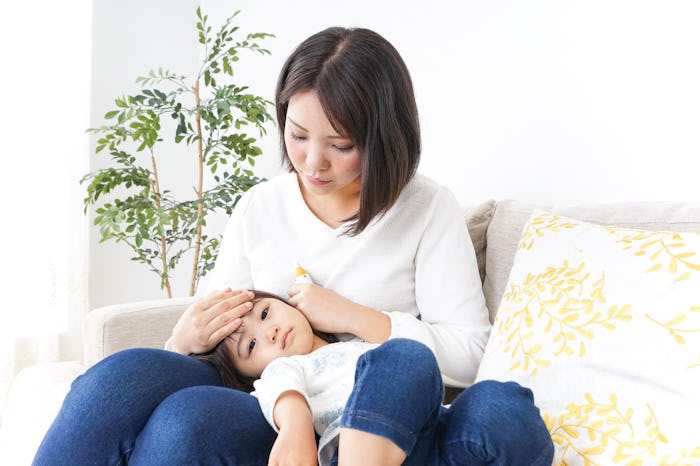Life

If Your Toddler Has A Stomach Bug, Here's How To Handle It
I remember the first time I woke up to my son projectile vomiting all over his room like some awful scene in a horror movie. There was my adorable 18-month-old, spewing forth what looked like everything he'd ever eaten in his life. It came out of him like a fire hose, and I was both horrified and somewhat impressed. Obviously I was also worried, but after he threw up, he was pretty cheerful. Still, I needed to know what to do if your toddler has a stomach bug beyond the logistics of the cleanup. I wanted my cheerful toddler to get healthy and stay healthy.
According to Harvard University, stomach bugs, also known as gastroenteritis, are usually mild and in 90 percent of cases in the United States, treatment by a physician is not necessary. However, if your child is listless, has a high fever, if the illness persists, or if you notice your child has glassy eyes or decreased urinary output, they suggest that you get your child seen. If they're just experiencing nausea, vomiting, and diarrhea, you can treat at home by providing them with water or juices, or solutions for oral rehydration like Pedialyte.
Let me tell you, you think you'll be an old hat at dealing with this by the time you have your second child, but au contraire. You just get to clean up puke and diarrhea in stereo. Because it's almost a guarantee that if one of your children gets it, the other one will as well. Just a few short weeks ago, my kids got attacked with a lovely case of norovirus, another fun stomach bug, and while my son was throwing up his sunny side up eggs and Cheerios (you're welcome for the visual), my daughter was making the bathroom smell like an overused port-a-potty at a music festival.
Needless to say, you want them to get better immediately. Seeing them sick hurts your heart and your delicate nature. Or whatever is left of your delicate nature after having children.
Our pediatrician gave us simple guidelines, and they match identically to what the American Academy of Pediatrics prescribes. The main risk for a stomach bug is dehydration, and the best way to avert that crisis is to offer small sips of water frequently, or Pedialyte if your provider suggests it. Just wait 30 minutes after they've thrown up to start offering. While you might be tempted to grab a bottle of sports drink, be wary as the sugar from these drinks can make diarrhea worse.
When I was growing up, the rule of thumb for a stomach bug was to follow the BRAT diet of bananas, rice, applesauce, and toast. However, this has been proven to be too restrictive and doesn't help as much as previously thought, according to the American Association of Family Physicians (AAFP). Instead, they suggest small amounts of a normal diet for patients who are vomiting and a standard, healthy diet for kids with diarrhea, unless instructed otherwise by a physician.
The study found that the best thing to do when your toddler has a stomach bug is to watch for signs of dehydration like lethargy and dry diapers, offer water or a rehydration solution if need be, eat well if you can, and for pity's sake, clean all the things. The AAFP suggested using diluted bleach on every surface that can handle it, use hot soapy water for everything else, and wash your hands like it's your job.
If your child is acting out of character, call their pediatrician immediately. While it may be nothing, it's best to follow your gut, especially when it comes to theirs.
Check out Romper's new video series, Bearing The Motherload, where disagreeing parents from different sides of an issue sit down with a mediator and talk about how to support (and not judge) each other’s parenting perspectives. New episodes air Mondays on Facebook.
This article was originally published on